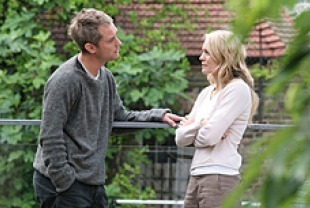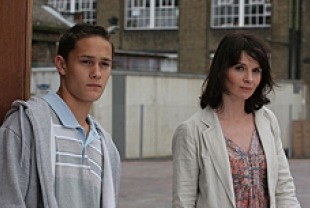We are used to thinking of the prohibition against stealing in the Seventh Commandment as referring to burglary, pickpockets, shoplifting, and petty theft. Under this umbrella, the poor are usually the ones who are seen as the culprits. Sometimes we acknowledge that white collar thieves are doing equal damage to the fabric of our society through tax evasion, stock market and insurance fraud, and so forth. But in our ethically complicated times, we need an even broader definition of stealing. In her book on The Ten Commandments: Laws of the Heart, Joan Chittister writes: "Stealing, in the biblical sense, is not so much a private or personal sin as it is a social sin. To take what we do not need, to destroy what is useful to another, to deprive those in the community of their basic needs is stealing."
This amplified understanding of stealing is at the core of Breaking and Entering, an ethically charged drama written and directed by Anthony Minghella. In his first original screenplay since Truly, Madly Deeply (1991), he sets the story in King's Cross in London, where the forces of gentrification and ethnicity are rubbing against each other, and sparks are flying. The area is known for crime, prostitution, drugs, and other urban troubles.
Will Francis (Jude Law) and his partner Sandy (Martin Freeman) own a landscape architecture company that has come up with an ambitious urban renewal plan that makes use of a canal as a solution to the problems that dog King's Cross. Unlike other entrepreneurial firms they are trying to walk their talk and have set up offices in a renovated factory building in the area. Imagine their dismay when the place is burglarized and Will loses his personal computer and a lot of other technical equipment.
Miro (Rafi Gavron), a Bosnian teenager who works for his Serbian uncle's gang, possesses the acrobatic skills needed to break into the building from the roof, turn off the alarm, and open the doors for the rest of the thieves. At first the police suspect the cleaning crew which consists mainly of Africans. Since Sandy is attracted to one of them, he rules out this possibility. When a second robbery takes place, the two men are baffled and angry. Will decides to stay close to the office and see if he can catch the culprits.
His absences bother Liv (Robin Wright Penn), a Swedish-American woman he has been living with for ten years. Their relationship is going through a bad patch, which is revealed when the two of them share their feelings of distrust in the presence of a therapist (Juliet Stevenson). One of the major sources of their disengagement is that Will is convinced that Liv has shut him out of her relationship with her emotionally troubled 13-year-old daughter Bea (Poppy Rogers) who doesn't eat much, can't sleep, and is obsessed with gymnastics.
While Will is sitting in his car near the offices, Oana (Vera Farmiga), a Romanian prostitute, invites herself in and chats with him, trying to make some money by offering him a smorgasbord of sexual services, which he declines. When he spots Miro trying to get into his building, he chases him through the streets to his home where he lives with Amira (Juliette Binoche), a tailor. Deciding to pursue the matter further, he brings some clothes for her to mend, and they talk. Her husband was killed in Sarajevo after they left the besieged city. Given his closed-down feelings for Liv, Will begins an affair with Amira. Given her total commitment to protecting her son, she is put in a very difficult place once she finds out that Miro is part of the robberies at Will's office. At this point, it's clear that another kind of stealing is taking place — Will's stealing of her heart and her hopes. Amira's reaction is very credible and sad.
Anyone familiar with Minghella's work as director on The English Patient, The Talented Mr. Ripley, and Cold Mountain knows he is able to explore the nuances of character and the complications of thorny ethical issues. Here attention to seemingly minor details add richness and texture to the story. For example, Will is extremely irritated by the sounds made by a wild fox outside his luxurious home. He is a very tidy person, a fact that he admits, and is uncomfortable with wildness. After the robberies, the compassionate cop (Ray Winstone) on the case notes that there's one law for the rich and one for the poor. He shows mercy toward Miro and gets his case into a restorative justice program. The only question is what role Will will take in the proceedings.
By the end of Breaking and Entering, Minghella has greatly amplified our understanding of the way people take important things from each other. And what we are left with is the conviction that we are put on earth to enrich the lives of others; when we take more than we give or diminish the stature of others, we are stealing. Taking what doesn’t belong to us in relationships is theft as well and that often turns out to be the most painful crime.

